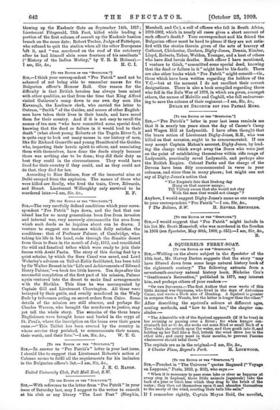[To THE EDITOR OP TELE "SPECTATOR."] SIR,—The very carefully defined
conditions which your corre- spondent "Pro Patria " lays down, and the fact that our island has for so many generations been free from invasion and internal war, very narrowly circumscribe the area from which such deeds as he inquires about can be drawn. I venture to suggest one instance which fully satisfies the conditions : that of Professor Palmer, of Cambridge, who, taking his life in his hand, rode through the Sinaitie desert from Gaza to Suez in the month of July, 1882, and conciliated the wild and fanatical tribes which were ready to join their forces with Arabi Pasha. The story of this daring feat by a quiet scholar, by which the Suez Canal was saved, and Lord Wolseley's advance on Tell-el-Kebir facilitated, has been told by Sir Walter Besasat in his "Life and Achievements of Edward Henry Palmer,"—a book too little known. Ten days after the successful completion of the first part of his mission, Palmer again ventured into the desert to make final arrangements sv:th the Sheikhs. This time he was accompanied by Captain Gill and Lieutenant Charrington. All three were betrayed by their guide, and cruelly murdered in the Wady Suclr by tribesmen acting on secret orders from Cairo. Some details of the mission are still obscure, and perhaps Sir Charles Warren, who brought the murderers to justice, may yet tell the whole story. The remains of the three brave Englishmen were brought home and buried in the crypt of St. Paul's, where the inscription on the brass over their grave runs :—" This Tablet has been erected by the country in whose service they perished, to commemorate their names,
their worth, and their fate."—I am, Sir, Sze., W. T. C.










































 Previous page
Previous page